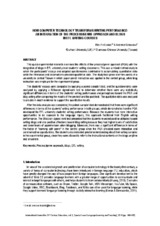How computer technology transforms writing performance: an integration of the process/genre approach and blogs in EFL writing courses
Autor
Chang, Wei-Yu
Szanajda, Andrew
Editor
Universidad de Córdoba, UCOPressFecha
2016Materia
Process/genre approachBlogs
EFL writing
METS:
Mostrar el registro METSPREMIS:
Mostrar el registro PREMISMetadatos
Mostrar el registro completo del ítemResumen
This quasi-experimental research examined the effects of the process/genre approach (PGA) with the
integration of blogs in EFL university-level students’ writing classrooms. This was a mixed-method study in
which the participants’ essays and adopted questionnaires contributed to accumulating quantitative data
while the interviews and observations provided qualitative data. The study took place over ten weeks at a
university in central Taiwan in which paper-pencil instruction was applied in the control group, while blog
instruction was employed for the experimental group.
The students’ essays were computed by applying a paired-sample t-test, and the questionnaires were
analysed by applying a Wilcoxon signed-rank test to determine whether there were any statistically
significant differences in terms of the students’ writing performance and perceptions toward the PGA and
blog writing after comparing the results of the pre-test and the post-test. The qualitative data was analysed
to provide in-depth evidence to support the quantitative results.
After the data analysis was completed, the paired-sample t-test demonstrated that there were significant
differences in terms of the students’ writing performance in both groups, which demonstrates how the PGA
developed the EFL university students’ writing performance. Because the students had more interactive
opportunities to be exposed to the language inputs, this approach facilitated their English writing
performance. The Wilcoxon signed-rank test presented that the students revealed positive attitudes toward
writing blogs and also positive affections toward blog writing because they had higher levels of satisfaction
and lower levels of apprehension when blogging. Moreover, there was a significant difference in terms of
the factor of “learning with peers” in the control group since the PGA provided more interactive and
communicative opportunities. The students also indicated greater understanding about their writing samples
in the experimental group, since they were allowed to refer to the instructional contents on the blogs anytime
and anywhere.

